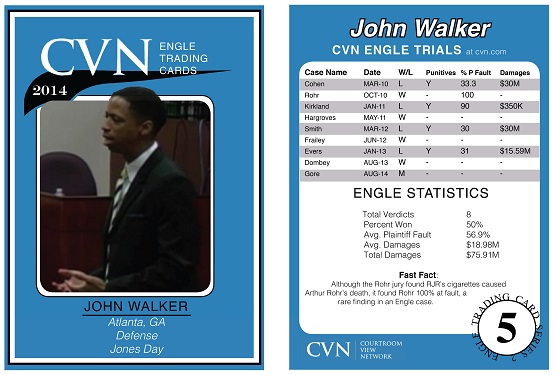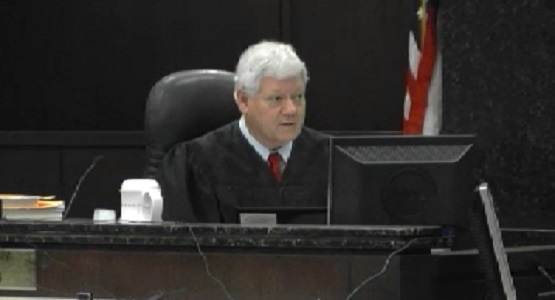Las Vegas—UnitedHealth Group HMOs could face more than a half-billion dollars in damages for their alleged role in the hepatitis infection of one of their clients, as jury selection is scheduled to begin in a Nevada negligence suit October 20. Bernard Paul v. Health Plan of Nevada Inc., et al.
CVN to Air Possible Half-Billion Dollar Nevada Suit Against HMOs
Posted by Courtroom View Network on Oct 15, 2014 1:53:00 PM
Topics: Negligence, Insurance, CVN National, Bernard Paul v. Health Plan of Nevada
Each Tuesday we issue a new Engle trading card featuring an attorney, trial, or firm from Florida’s Engle progeny tobacco cases. Our exclusive cards provide a light-hearted way to track important statistics through years of this landmark tobacco litigation.
John Walker, of Jones Day's Atlanta office has represented R.J. Reynolds in the trials since 2010. Click here for a larger version of his card.
Topics: Engle Litigation Trading Cards
Opening Statement of the Week: Marc Howard in McCray v. Ming Xuan Inc.
Posted by Arlin Crisco on Oct 13, 2014 11:48:23 AM
If you're a plaintiff's attorney in a personal injury case, it's critical that your jury understands the circumstances of the accident at the heart of the case from your point of view. Visual aids such as photographs and computer simulations can help highlight the events that caused the accident. But, as Marc Howard showed in his opening statement of McCray v. Ming Xuan Inc, sometimes the most effective way to explain an accident is to reenact it yourself.
Topics: Negligence, CVN Local: Georgia, Opening Statement of the Week, Trial Techniques
Topics: Negligence, Engle Progeny, Tobacco Litigation
J.P. Morgan Argues That Mistake in UCC Filing Did Not Terminate Its Interest in $1.5 Billion Loan to GM
Posted by Arlin Crisco on Oct 9, 2014 2:48:22 PM
Topics: Bankruptcy, UCC






